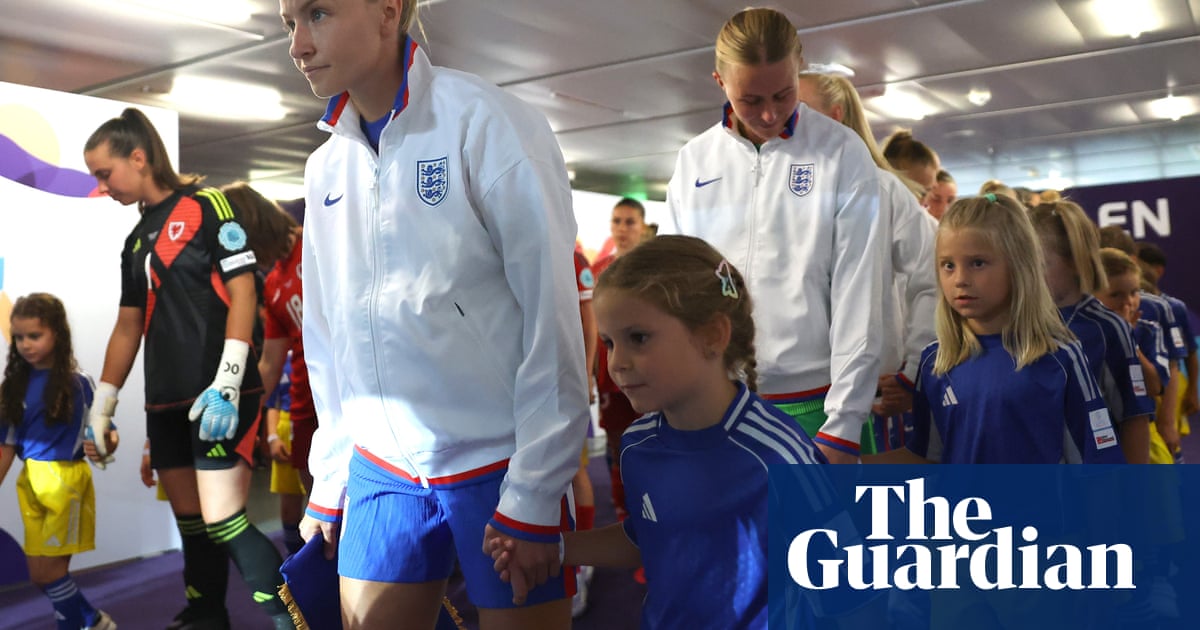
The homeless man lies in the doorway of England’s team hotel every morning and every night. The players pass him as they go to training and pass him again as they come back at the end of the day. His shirt is unbuttoned as he sleeps, dirt-smeared bags perched under his resting arm. The hotel staff barely even notice him any more. Security do not move him on. After all, he’s supposed to be there.
And unless you decided to peer particularly closely, you might not even notice that the homeless man in the doorway of the Dolder Grand hotel in Zurich is not a human being at all but a hyper-realistic sculpture called The Traveler, created by an American artist called Duane Hanson in the 1980s and bought by the Dolder Grand hotel in Zurich in the late 2000s as a symbol of … well, what exactly?
We can assume for starters that the juxtaposition is not accidental. So why does a Swiss luxury hotel where rooms cost upwards of £1,000 a night choose to install a sculpture of a homeless man at its front door? An act of subversive arch provocation towards its moneyed guests? A kind of postmodern soul food disguised as an act of subversive arch provocation? Is it supposed to challenge or is it supposed to comfort?
“Selling rooms alone is not enough today,” says the hotel director Markus Granelli. “We have to entertain people.” But Hanson – who died in 1996 – never regarded himself as an entertainer so much as a truth-teller, a faithful chronicler of the American working class whose work always had an overtly political dimension. How would he feel about this piece being presented in this setting?
And – more pertinently, for our purposes – how do England’s footballers feel when they see it? Does it discomfort them, titillate them, gross them out? Where do their ultimate sympathies lie? With the browbeaten outsider? Or with the luxury brand graciously allowing this fibreglass vagrant to shelter in its doorway?
Perhaps it was quietly telling that thoughts on the England bus back from St Gallen after their 6-1 win over Wales had already begun to turn towards Zurich, where they will play their quarter-final against Sweden on Thursday night. “We were so excited to get back to the hotel,” Lucy Bronze said. “Zurich’s like our little home stadium now. We’ve made it our little Wembley.”
England love this place. They love the luxury, they love the seclusion, they love the swimming lake and the running trails, the padel courts and the dinky coffee shops. They love the way it is a place you can explore and also a place you can escape. The contrast with Terrigal at the 2023 World Cup, a delightful New South Wales coastal resort that also felt a significant distance from anywhere remotely interesting, is manifest.
Sweden secured their qualification for this European Championship in a playoff in December 2024, by which time most of the plum Swiss resorts had been snapped up. They then lost a coin toss with the Netherlands for first choice of the rest. So they ended up rejecting the Uefa‑approved five-star hotel they were offered and taking rooms in a sports complex near Zug where construction works are still taking place on the exterior. Not luxurious, by any stretch of the imagination. But in many ways the perfect place to gestate the gritty underdog mentality that has brought them to their ninth consecutive knockout stage of a major tournament.
Quick GuideEngland v Sweden: past three meetings
Show
England 4-0 Sweden, 26 July 2022, Sheffield
“One of the best goals you will ever see,” the former England defender Stephen Warnock said – and few disagreed. Alessia Russo’s audacious backheel nutmeg sealed England’s third in style, a goal of the tournament winner from the bench. The Euro 2022 semi-final against Sweden played out like a dream: Beth Mead opened the scoring, Lucy Bronze powered in a header, and Fran Kirby’s clever lob capped it off. Four goals, four statements. The Lionesses were ruthless. Sweden simply had no reply.
England 1-1 Sweden, 5 April 2024, London
Sweden looked nothing like the side torn apart at Euro 2022. In a closely contested qualifier, they held firm against an England team dominant in possession but short on chances. Alessia Russo, once again in imperious form, broke through with a striker’s dream – a one-on-one calmly slotted home. Both sides grew bolder as the game wore on. A moment’s lapse from the Lionesses and Sweden’s rising star Rosa Kafaji Roflo punished them with an electric equaliser – well-earned.
Sweden 0-0 England, 16 July 2024, Gothenburg
It may have ended goalless but England got what they came for. A draw in Gothenburg sealed their place at Euro 2025. “Keeping it to 0-0, qualifying from a very hard group – I’m very relieved,” the head coach, Sarina Wiegman, said. The Lionesses impressed early but faded, relying on the goalkeeper Hannah Hampton to keep their clean sheet. Georgia Stanway came closest to scoring with a strike from distance. Sweden, backed by a lively home crowd, failed to capitalise on the buzz.
Nasra Abdi
This was the danger to which Leah Williamson was alluding when she described Sweden as a “relentless” tournament side. There is an argument to be made that alongside the United States, Sweden are the most consistent international team on the planet: eight straight quarter-finals in the Euros, eight out of nine group-stage progressions in the World Cup (and the other denied on goal difference), to go with Olympic finals in 2016 and 2021.
Here they won a group almost as tough as England’s, smashing Germany 4-1 in the process. In a way they are a model of tournament consistency and as such the perfect gauge of England’s progress through this tournament: have Sarina Wiegman’s side genuinely improved, or has the quality of their opponents, from France to the Netherlands to Wales, simply got progressively worse?
One of Wiegman’s great strengths is in not overburdening her players with tactical or technical knowledge, in striking the right balance between work and play. This is particularly germane during the knockout stages, with their subtly different energy, where there is always a balance to be struck between complacency and anxiety. Prepare too little and you send the wrong message. Prepare too much and you send frissons of panic through the squad. Sweden deserve respect, but not to an excessive extent. So how to play it?
after newsletter promotion
Perhaps the perfect clip is Sweden’s second goal against Germany, a goal created by Nathalie Björn’s enterprising run out of defence, drawing opponents towards her and finding Smilla Holmberg, who ultimately scores. But at a crucial moment Björn almost loses the ball to Elisa Senss, retaining possession through a fortuitous deflection. Had she been tackled, Germany would have had a three-on-two break.
These are the margins at this level. And even if we disregard the fact that at this tournament Germany have been the footballing equivalent of the password “password123”, here lies both the threat and the opportunity for England, whose pressing in the Sweden half needs to be perfect.
The veteran playmaker Kosovare Asllani remembers their first training session under Peter Gerhardsson in 2017, when the coach stepped in to warn the defence not to keep kicking the ball away, to trust in their technical ability, to risk giving the ball away in the knowledge that they could always get it back. In so doing Gerhardsson – who will be replaced by Tony Gustavsson after the tournament – helped to shed Sweden’s self-image as a team reliant on physicality and set pieces.
Which is not to deny the extent to which Sweden can still mix it. Sweden and England are the tournament’s two highest scorers in terms of expected goals, the two most prolific crossers. Sweden have committed the joint-most fouls, while earning the joint-fewest yellow cards. And even if Gerhardsson hates the term “adaptation” because of its defensive connotations, this is a team familiar with their own method, with multiple ways of hurting you.
Sweden’s reliability has made them a tournament team to be respected. But by the same token England’s unpredictability has made them a tournament team to be feared. In 2022 and again in 2023, they exhibited an expert ability to focus their efforts where they would be most needed, the ability to do just enough to win. There are goals coming from all areas of the pitch. This may just be the worst time to play them.
And here, perhaps, lies the real meaning of the sculpture in the doorway: a deliberate note of dissonance, an implied challenge to the super-rich. Here we all are, looking at the stars. But we are only ever one misstep from the gutter.








